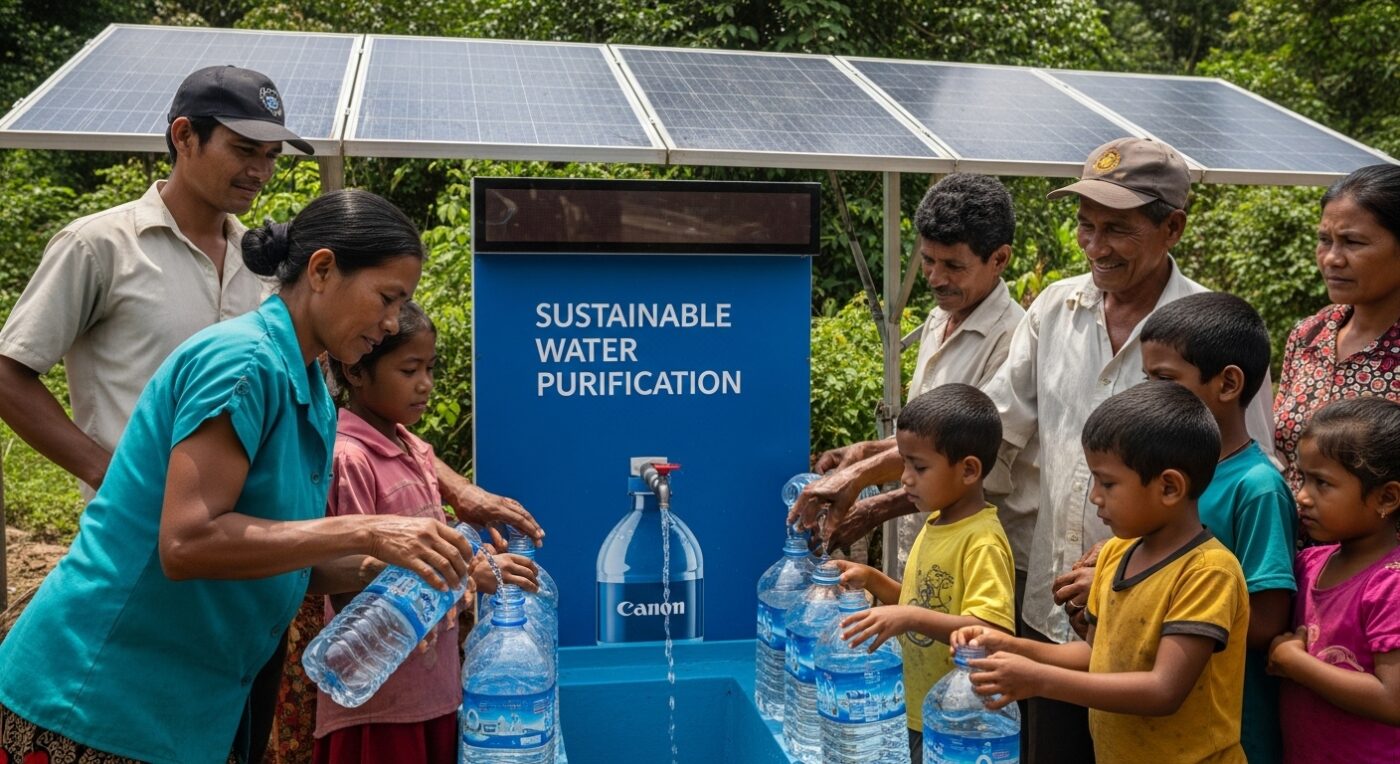Uncategorized
Understanding Sustainable Water Purification Methods
Water scarcity is pushing cities and communities to rethink how they clean and reuse water. Yet most people are shocked to learn that traditional water treatment plants can use as much as 4 percent of a city’s entire electricity supply. It sounds counterintuitive, but the real breakthroughs in water purification are not only about cleaning water—they are about doing it with less energy, fewer chemicals, and leaving nature better off.
Below is a comparison of traditional and sustainable water purification methods to highlight differences in energy usage, chemical reliance, and ecological impact.
| Aspect | Traditional Methods | Sustainable Methods |
|---|---|---|
| Energy Consumption | High (up to 4% of city power) | Reduced through energy-efficient processes |
| Chemical Use | Heavy reliance on synthetic chemicals | Minimized, favoring natural and biological systems |
| Environmental Impact | Significant carbon emissions and waste | Lower emissions; less ecosystem disruption |
| Technology Components | Mainly mechanical and chemical processes | Integrates natural and advanced green technologies |
| Resource Recovery | Rarely emphasizes reuse or recovery | Focus on circular water and resource recovery |
Table of Contents
- What Are Sustainable Water Purification Methods?
- Why Sustainable Water Purification Methods Matter
- How Sustainable Water Purification Works
- Key Concepts In Sustainable Water Purification
- Real-World Applications Of Sustainable Water Purification
Quick Summary
| Takeaway | Explanation |
|---|---|
| Sustainable purification methods reduce ecological impact | These techniques minimize energy use and chemical applications while ensuring water quality preservation. |
| Natural and technological systems improve efficiency | Combining biological filtration and advanced technology enhances water treatment effectiveness without heavy reliance on chemicals. |
| Circular water management promotes resource reuse | This approach focuses on recycling water resources rather than treating them as disposable, enhancing sustainability. |
| Safe water access improves community health | Sustainable methods provide clean water while lowering long-term environmental risks, benefiting public health and resilience. |
| Tech innovations drive practical solutions for water challenges | Cutting-edge technologies tackle water issues effectively across urban and rural settings, enhancing overall water management systems. |
What are Sustainable Water Purification Methods?
Sustainable water purification methods represent innovative approaches designed to clean and treat water while minimizing environmental impact and preserving natural resources. These techniques go beyond traditional filtration by incorporating ecological principles, energy efficiency, and long term water quality management.
The Core Principles of Sustainability in Water Treatment
Sustainable water purification focuses on three fundamental aspects: reducing energy consumption, minimizing chemical usage, and creating systems that can be maintained with minimal environmental disruption.
 According to research from the Centers for Disease Control and Prevention, these methods prioritize both water quality and ecological preservation.
According to research from the Centers for Disease Control and Prevention, these methods prioritize both water quality and ecological preservation.
Key principles of sustainable water purification include:
- Utilizing renewable energy sources like solar power for treatment processes
- Implementing natural filtration mechanisms such as biological systems
- Designing water treatment technologies with low carbon footprints
- Developing decentralized water purification solutions
Technology and Natural Processes in Sustainable Water Treatment
Sustainable water purification integrates advanced technologies with natural filtration processes. For instance, some innovative approaches leverage biological membranes, activated carbon filters, and constructed wetlands to remove contaminants without heavy reliance on synthetic chemicals. These methods transform water treatment from a purely mechanical process into an ecosystem-friendly approach.
By exploring our comprehensive guide on water filtration methods, you can gain deeper insights into how modern technologies are revolutionizing water purification while maintaining ecological balance.
Why Sustainable Water Purification Methods Matter
Sustainable water purification methods are not merely technological solutions but critical interventions addressing global environmental and public health challenges. These approaches represent a transformative strategy for managing water resources in an increasingly complex and resource constrained world.
Environmental and Economic Impact
The significance of sustainable water purification extends far beyond simple water treatment. According to research from the National Academies of Sciences, Engineering, and Medicine, these methods play a pivotal role in addressing critical global challenges such as water scarcity, environmental degradation, and climate change adaptation.
Key environmental benefits include:
- Reducing carbon emissions associated with traditional water treatment processes
- Minimizing chemical contamination in water ecosystems
- Preserving natural water filtration mechanisms
- Supporting biodiversity by maintaining healthier water systems
Public Health and Community Resilience
Sustainable water purification methods directly contribute to improving community health outcomes by providing safe, clean water while simultaneously reducing long term environmental risks. These approaches create resilient water management systems that can adapt to changing environmental conditions and increasing population demands.
Moreover, by exploring our comprehensive guide to water purification terms, you can gain deeper insights into the intricate science behind these transformative water treatment technologies.
The global implications are profound: sustainable water purification represents a critical strategy for ensuring water security, protecting public health, and maintaining ecological balance in an era of unprecedented environmental challenges.
How Sustainable Water Purification Works
Sustainable water purification represents a complex, multifaceted approach that integrates advanced technologies, natural processes, and ecological principles to transform contaminated water into safe, usable resources. These methods combine scientific innovation with environmental consciousness to deliver comprehensive water treatment solutions.
This table summarizes key features and mechanisms used in sustainable water purification, organizing them by process type and their role in treatment systems.
| Mechanism Type | Example Technology or Process | Primary Role in Purification |
|---|---|---|
| Biological Filtration | Constructed wetlands | Uses plants and microbes to break down pollutants |
| Advanced Membrane Systems | Biological membrane filtration | Removes contaminants with low energy use |
| Activated Carbon Filters | Activated carbon | Adsorbs organic compounds and impurities |
| Renewable Energy | Solar-powered systems | Powers purification processes sustainably |
| Closed-Loop Recycling | Graywater & stormwater reuse | Recycles water within local systems |
Natural and Technological Filtration Mechanisms
Sustainable water purification leverages both natural and engineered filtration mechanisms to remove contaminants effectively. According to research from the National Academies of Sciences, Engineering, and Medicine, these approaches focus on creating decentralized, energy-efficient systems that minimize environmental impact.
Key filtration mechanisms include:
- Biological membrane systems that mimic natural ecosystem filtration
- Activated carbon filters that absorb organic compounds
- Constructed wetlands that use plant-based purification processes
- Membrane technologies with low energy consumption
Energy and Resource Recovery Strategies
Modern sustainable water purification goes beyond simple filtration by incorporating energy recovery and resource optimization techniques. These strategies transform water treatment from a linear process into a circular system where energy and materials are continuously recycled and reused.
Technological innovations like membrane filtration powered by renewable energy sources enable water treatment facilities to significantly reduce their carbon footprint. Learn more about advanced UV purification technologies to understand how cutting edge methods are revolutionizing water treatment.
The intricate interplay between natural processes and advanced technologies ensures that sustainable water purification methods not only clean water but also protect and regenerate ecological systems.
Key Concepts in Sustainable Water Purification
Sustainable water purification represents a complex ecosystem of interconnected scientific principles, technological innovations, and environmental strategies designed to transform water treatment from a linear process to a holistic, regenerative approach. Understanding these fundamental concepts provides insight into the profound potential of modern water management techniques.
Circular Water Management Systems
Circular water management represents a revolutionary paradigm in sustainable water purification. According to research from the National Academies of Sciences, Engineering, and Medicine, this approach focuses on continuously recycling and reusing water resources rather than treating them as disposable.
Critical components of circular water management include:
- Capturing and treating graywater from domestic sources
- Implementing stormwater harvesting techniques
- Developing decentralized water treatment systems
- Creating closed loop water recycling infrastructures
Ecological Filtration and Biomimetic Technologies
Sustainable water purification increasingly draws inspiration from natural ecosystems, leveraging biomimetic technologies that replicate biological filtration processes. These innovative approaches transform water treatment from an industrial process into a more organic, self-regulating system.
Biomimetic technologies simulate natural water purification mechanisms found in ecosystems, using strategies like plant-based filtration, microbial interactions, and adaptive membrane systems. Explore our comprehensive guide on water purification technologies to understand how these cutting edge methods are revolutionizing water treatment.
The convergence of scientific innovation, ecological understanding, and technological advancement represents the future of sustainable water purification methods.
Real-World Applications of Sustainable Water Purification
Sustainable water purification has transcended theoretical concepts, emerging as a practical solution addressing critical global water challenges across diverse environments. From urban infrastructure to rural communities, these innovative approaches are transforming how societies manage and treat water resources.
Urban Water Management Strategies
Urban environments represent complex ecosystems where sustainable water purification methods can significantly impact resource management. According to research from the U.S. Environmental Protection Agency, nature-based solutions are revolutionizing municipal water treatment systems.
Key urban applications include:
- Implementing green infrastructure for stormwater management
- Creating urban wetlands for natural water filtration
- Developing decentralized water recycling systems in residential complexes
- Integrating rainwater harvesting technologies in city planning
Agricultural and Rural Water Treatment Solutions
Sustainable water purification methods have profound implications for agricultural and rural communities, where access to clean water is often limited. These approaches focus on developing localized, low-cost water treatment solutions that can be easily implemented and maintained.
Innovative technologies like biowaste-derived nanomaterials and nanocellulose-based filtration systems are providing cost-effective alternatives for water treatment. Learn more about the benefits of investing in advanced water purification technologies to understand how these solutions can transform water access and quality.
The real-world applications of sustainable water purification demonstrate that technological innovation can directly address critical environmental and social challenges, offering hope for more resilient and equitable water management systems.

Ready for Truly Sustainable Water at Home?
Choosing sustainable water purification methods is not just an academic idea—it is a real solution for anyone concerned about water safety, health, and environmental impact. As explored in the article, challenges like reducing chemical use, improving energy efficiency, and creating resilient water systems are urgent for modern households. Yet, finding a practical system that delivers clean water without harming the planet can still seem overwhelming.

At Coway Water Purifier, we bring advanced water filtration directly to your kitchen or office, inspired by the very principles discussed above. Our products offer high-powered purification using smart, energy-saving technology that aligns with your sustainable goals. Explore available water and air purifiers designed to deliver safety and peace of mind, with services like free installation and maintenance included. Want to take the next step toward healthier, planet-friendly water? Visit Coway Water Purifier to discover which model fits your needs. Act now and turn your commitment into action with a solution you can trust.
Frequently Asked Questions
What are sustainable water purification methods?
Sustainable water purification methods are innovative approaches that clean and treat water while minimizing environmental impact and conserving natural resources. They focus on energy efficiency, reducing chemical use, and maintaining water quality.
How do natural filtration systems work in sustainable water purification?
Natural filtration systems use ecological principles, such as biological membranes, constructed wetlands, and activated carbon filters, to remove contaminants without relying heavily on synthetic chemicals. These systems simulate natural processes to ensure effective purification.
What are the environmental benefits of sustainable water purification?
Sustainable water purification reduces carbon emissions, minimizes chemical contamination, preserves natural filtration mechanisms, and supports biodiversity by creating healthier water ecosystems.
How can communities implement sustainable water purification methods?
Communities can implement sustainable water purification methods through strategies like graywater recycling, stormwater harvesting, and establishing decentralized treatment systems. These approaches provide localized, cost-effective solutions to ensure clean water access.
Recommended
- 7 Top Water Filtration Methods You Need to Know – Coway Water Purifier
- 7 Effective Water Purification Methods for Your Home – Coway Water Purifier
- Understanding the Role of UV in Water Purification – Coway Water Purifier
- Understanding Water Purification Terms Explained Clearly – Coway Water Purifier

